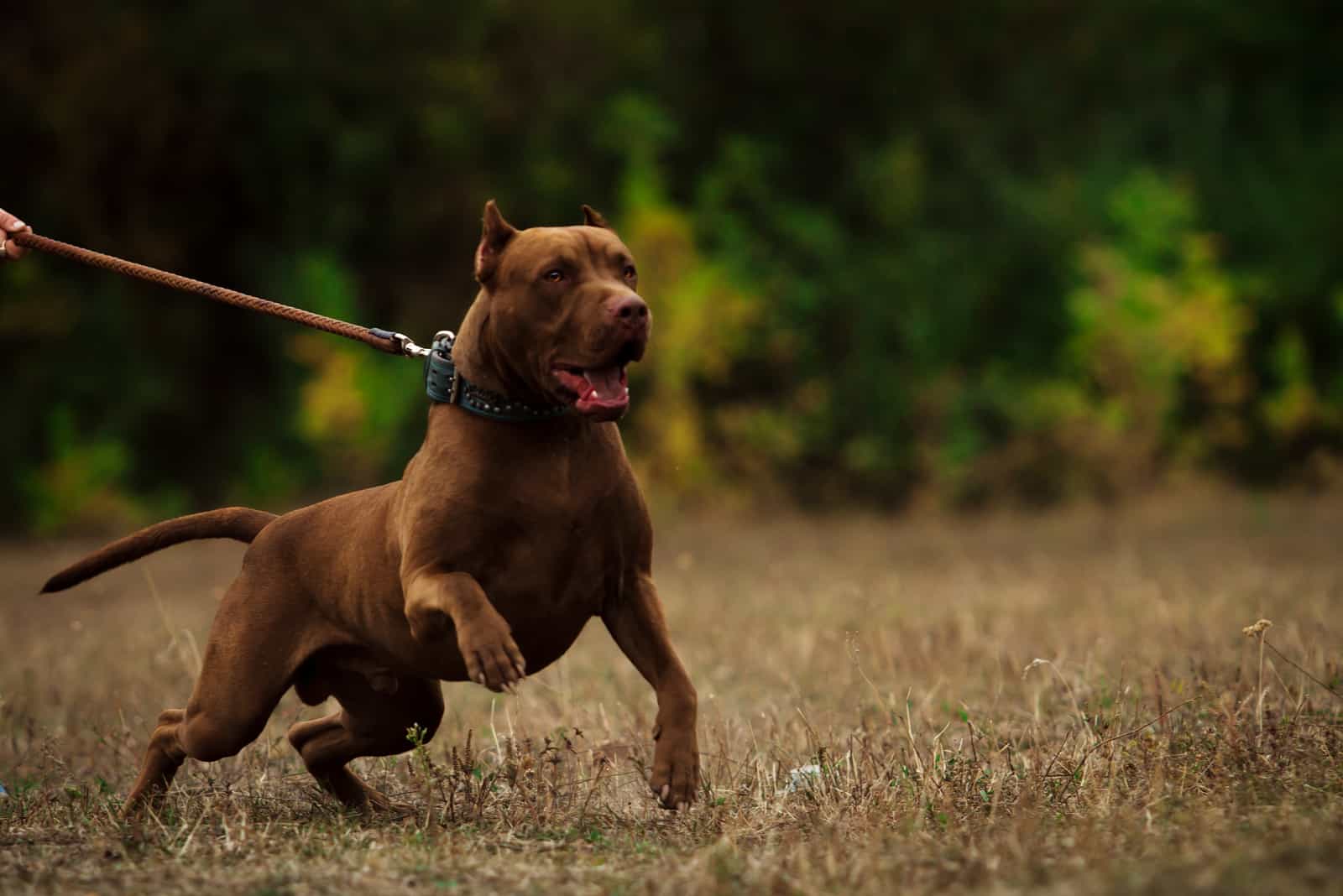All dogs communicate by barking. This is entirely normal, and barking is a part of their natural instincts.
However, why dogs bark is an entirely different story. Dogs can bark for reasons we don’t always understand. In fact, it seems like most of the time, we find ourselves wondering Why is my dog barking at nothing?
Despite what you might think, your dog isn’t crazy – nor are you for not noticing anything. Dogs simply have stronger senses than we do. They see, smell, hear, and feel things that we cannot because their genetics allow them to.
Sometimes, however, dogs can develop excessive barking if the reason behind vocalization stems from some specific need that isn’t met, or simply because you’ve tolerated their barking longer than you should have.
In a way, dogs are like kids. They’ll behave in a certain way just because they know they can. This is why dog training is important. Otherwise, your pooch will simply continue barking until you go deaf!
If you catch yourself constantly asking “Why is my dog barking at nothing, and what can I do to stop him?”, this article is for you.
We’ll give dog owners the answers to this burning question, while also giving advice on how to train your dog to stop barking at a command.
Understanding Dog Barking
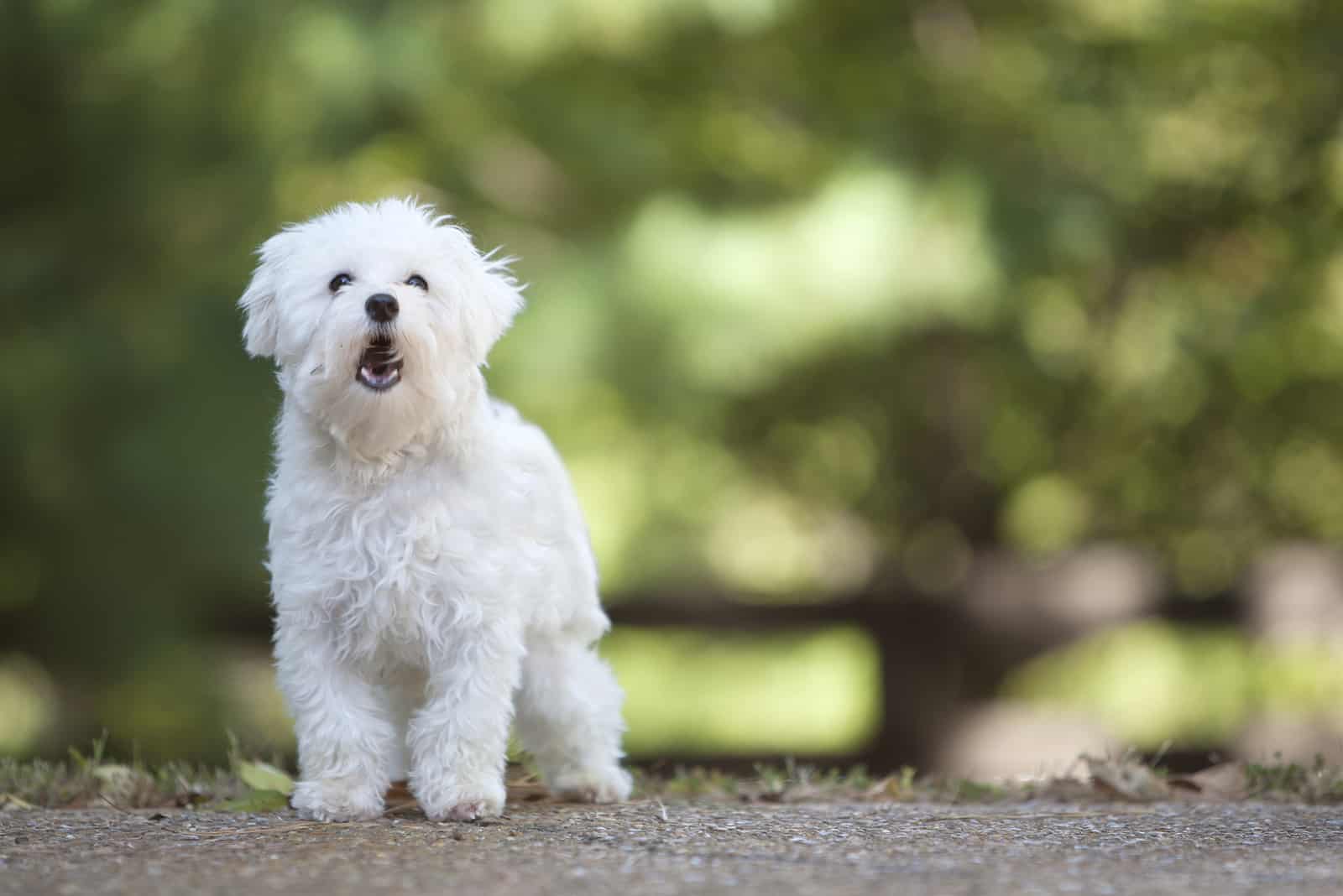
Before we give you the answer to the question, Why is my dog barking at nothing?, we have to explain the general root of this unwanted behavior.
All dog breeds bark. Barking is a dog’s way of communication, and they’ll bark for many reasons, such as separation anxiety, territorial behavior, injury, illness, fear, to alarm pack members of incoming danger, and so on.
Some breeds, however, tend to bark more than others. This includes:
• Beagles
• German Shepherds
• Chihuahuas
• Shetland Sheepdogs
• Parson Russell Terriers
• Yorkshire Terriers
• Cairn Terriers
• Fox Terriers
• Miniature Schnauzers
Dogs can bark in different tones and pitch depending on the situation. This can help you decide on what it is they are barking about.
In fact, dog barking means more than just ‘Hey’ or ‘Watch out!’. Barking is their only way of letting you know what’s on their mind. Because of this, there are many different barks depending on the mood.
A canine can vary the pitch of the bark, as well as how many times he’ll bark in a row and how long the periods will be between the barks. This will let you know what your dog wants. A general rule of thumb is that the deeper the bark, the more serious your dog is.
Look at your dog during playtime. Chances are he’s barking at a high-pitch tone. However, if your dog suspects that an intruder is on your property, he’ll have a deep, low tone in his voice.
On the other hand, the more barks in a row, the more aroused your dog is. Think of a single bark as ‘Huh?’ or ‘Stop it!’. But, when there are lots of barks in a row and it lasts for a long time, your dog is likely worked up.
Finally, the space between barks speaks about the aggression behind the dog’s voice. If the barks go quickly one after the other, this means that he is having strong, aggressive emotions.
A dog that barks as a warning before an attack will bark at a much faster pace compared to a dog that just wants to be left alone.
One fun fact: It appears that humans, even those who don’t own dogs, are quite good at determining what the emotion is behind the dog’s bark.
A piece of research was conducted to see how well people can read dog barks. Prerecorded barks were played to an audience who then had to put the barks in a certain category – each describing a certain situation that would cause a dog to bark.
Most people managed to successfully match the bark with the situation that caused it based on the three features we’ve listed. This proves that dogs and humans have evolved to understand each other.
This common understanding is essential for understanding why your dog is barking and how you can prevent this behavior.
Why Is My Dog Barking At Nothing All Of A Sudden?

There are several common reasons behind a dog’s barking. All of them are entirely normal, and you should never expect to make your dog stop barking altogether. However, excessive barking or barking at a time when you’re not expecting it can be an issue.
Here are the reasons behind a dog’s barking:
Territorial
Some dogs are more territorial than others. They will protect their territory and their owners, and barking is a way to warn an intruder of their intentions.
As such, if an unknown person or an animal comes into the area that your dog considers his own, he’ll likely start to bark. The closer the alleged threat, the louder the barking.
When being territorial, your dog will often look aggressive or alert. It’s important to train your dog when it’s okay to be territorial and when he has to stop. A territorial dog can be dangerous.
As your dog has a greater sense of smell and hearing than you do, he’ll be able to notice the so-called threat long before you do. This is why you might think your dog is barking even when there is nothing there.
Fear
Dogs can bark when something startles them or catches their attention. This happens all the time, and not just in their home territory.
When a dog is barking out of fear, you’ll notice that his ears are moved back and the tail is tucked. This represents the state of fear, and sometimes his barking can even be high-pitched.
Boredom

Dogs that are bored will bark as a way to let you know that they have nothing better to do. This is especially the case with intelligent dogs, such as Corgis, Poodles, or Border Collies, that need more mental stimulation than most other breeds.
When a dog is bored, this will result in destructive behaviors such as biting and clawing at your shoes, walls, or carpets.
Loneliness
Dogs are pack animals. They love to have company. If you leave them alone for a prolonged period of time, they might get bored – and, as we’ve seen, this results in destructive behaviors and excessive barking.
Loneliness can also worsen their separation anxiety, but more on this later on.
Excited Bark
Dogs often bark when they’re greeting people or other animals. This is a happy bark, which is usually high-pitched and followed by tail wags and happy jumping.
They will also bark during playtime, as this is their way of letting you know they are having a blast.
Sometimes, a dog will have a great time on his own, which might cause him to bark and jump around, even though you might think that there is no reason for him to behave in such a way.
Attention Seeking
Dogs love attention, and they love to be in the center of the crowd. If they don’t get it, they’ll bark so you have no other option but to look at them.
In fact, this is the main reason why a dog will bark seemingly without any reason, especially if you’re watching a movie and working from home instead of playing with him.
Some dogs will bark when they are hungry or want a treat, and dog training is essential to let them know that barking isn’t a way for them to get what they want.
Separation Anxiety
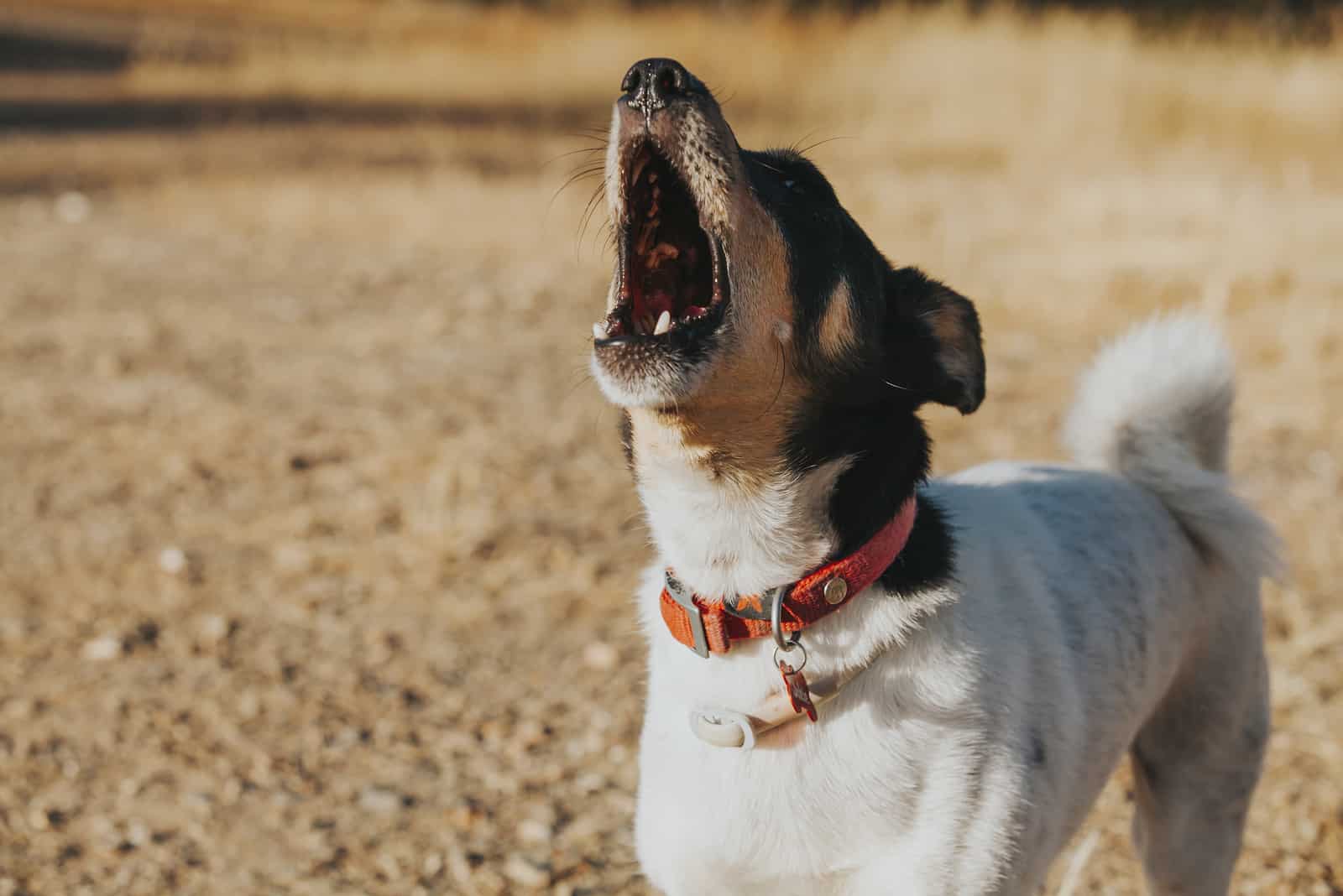
Some dogs are prone to separation anxiety. Separation anxiety is different from regular loneliness. Dogs that are lonely are bored, and bored dogs bark so they can have some fun. Dogs with separation anxiety get anxious at the mere thought of their owner leaving, so they’ll start barking excessively.
Separation anxiety isn’t healthy, and it can cause great problems for both the owner and the dog. An anxious dog will whine, cry, and bark, and he might even exhibit some destructive behaviors.
These pups are more likely to express clingy dog behaviors such as sleeping close to you, under the blankets with you, or following you to the bathroom.
The best way to deal with a dog that has separation anxiety is to contact a professional dog trainer and behaviorist who might help you give comfort to your stressed-out dog.
Compulsive Barking
Believe it or not, some dogs can get OCD, just like humans. This can cause them to exhibit compulsive behaviors, including barking.
Dogs that are compulsive barkers will bark out of no reason seemingly just to hear the sound of their own voice. The barking will usually be in the same pattern, and it can last for hours.
Most compulsive barkers will exhibit some other compulsive behaviors as well, such as running in circles or walking along the fence.
If you suspect your dog has an issue with compulsive barking, you should contact an animal behaviorist who can explain this behavior and help you find a solution.
Health Problems
Dogs will also bark to let you know they are in pain. Certain health issues are rather uncomfortable, and the dog has no other way to let you know he is suffering other than to bark.
If anything, maybe there are mosquitoes or fleas that have been flying around and biting him, so he’ll bark both from fear and from pain.
If your dog didn’t use to bark at anything, but he has suddenly started expressing this behavior, it might be a good idea to take him to the vet for a quick consultation. They might let you know if something is wrong, or if they suspect a certain health issue is causing him to bark.
Why Is My Dog Barking At Nothing At Night?

As night is the most common time when dogs bark, the burning question is Why is my dog barking at nothing at night?
Dogs can get by in the dark much better than we humans. As they don’t rely on their sense of sight as much as we do, they can sense movement even in the pitch dark.
Because of this, many times, we’ll think that our dog is barking at nothing in the night, while the truth is that he simply saw something we didn’t.
Whether that is a squirrel, a person walking on the street, or a burglar, your dog will know something is out there much sooner than we would. Sometimes, they’ll notice things we could never be wary of. As such, we’ll often think that they are barking at nothing, but the truth is that they’ll be saving us from threats visible only to them.
Why Is My Dog Barking At Nothing In The House?
Most of the time, you’ll notice that your dog is barking at nothing while he’s in the house, as this is where both of you spend the most time together.
Look at your dog’s body language when he’s barking. This might let you know what the emotions behind the vocalization are. Is your dog afraid, or maybe angry? Chances are he saw someone walking past your backyard that he has mistaken for a trespasser.
Maybe your dog is bored, and he’s done playing with his toys, so he wants to get your attention. He might also be hungry or have to go for a walk. Potty-trained dogs will sometimes bark to let you know they can’t hold it much longer.
Dogs will bark for a variety of health concerns as well. As we’ve mentioned before, there are many health conditions that are extremely painful, and your dog might be crying for help.
Try to examine the situation and see what is happening in your environment when the dog is barking. If he’s always barking in the morning, maybe there is a mailman that your dog feels suspicious about. If there are sirens, then this might be the sound your pup is reacting to.
In any way, it might be a good idea to check with the vet if the barking is getting out of hand. You can never be entirely certain what the underlying cause is.
A Dog’s Enhanced Senses

The main thing that makes we owners wonder Why is my dog barking at nothing? is their amazing sense of hearing. Dogs have ears capable of hearing many things that human ears cannot.
Dogs can detect frequencies ranging from 40 to 60,000 Hertz. Compared to that, humans can hear only 20 to 20,000 Hertz – frequencies we call sonic. Dogs, on the other hand, hear sounds that we consider ultrasonic.
Ultrasonic sounds have a higher pitch than the sounds we hear. This includes mice squeaks and similar sounds that we cannot hear, even in a quiet, night environment. They can also hear dog whistles used by dog trainers and some animal owners.
However, hearing isn’t the only dog sense that is enhanced. They might also bark after detecting some other stimuli, such as smell.
Dogs’ noses have about 220 million olfactory receptors. These are receptors that collect smells. Humans, on the other hand, only have 5 to 6 million of these receptors. As you can guess, this means that dogs have a superior sense of smell compared to humans.
Their mighty noses allow dogs to detect drugs, explosives, and they can even detect certain bugs! As such, they can easily smell wild animals or other dogs that might be roaming around your property. This can lead to excessive barking behavior, especially if your dog is frustrated as he cannot go outside to get to the source of the smell.
How To Reduce Dog Barking

Now that you’ve learned the answer to the question, Why is my dog barking at nothing?, it’s time to get to the one that follows, and that is: How do I make my dog shut up?
While we all love our dogs no matter their behavior, there are many advantages to having a quiet dog from time to time, especially if you live in an apartment or if your neighbors aren’t that happy about all the noise.
However, solving barking behavior isn’t that easy, especially if you don’t know exactly what’s causing it. This is why you need to recognize what’s making your dog bark. If you don’t get to the root of the problem, chances are you won’t be able to solve it.
If you’ve never heard your dog bark at nothing, or if he has never barked for such a long period of time, the first place you should go to is your vet – especially if he appears to be in pain. Chances are he got sick or injured, and this is what’s making him bark. Healing the health problem would make him remain silent.
However, if he is healthy, this means the problem is strictly behavioral.
Look at the environment and try to see if something has changed. Maybe you’ve bought a new sofa or a new plant that’s scaring your dog, or the neighbors have bought a dog that your pooch can smell.
Of course, understanding the cause is simply the first step of the journey to making your dog stay quiet. Here are a few things you can do to try to stop barking in dogs:
Remove the Motivation
Some dogs bark because something from their environment is motivating them for this behavior.
For example, let’s imagine that your dog barks at a passerby that walks by your house every day. There are a few possible scenarios.
First, your dog might be barking when they walk by your window. This is because your dog can see them clearly from that location.
To remove the motivation, you should close the curtains, or not allow your dog to stay in the room with the said window. This will block his view, disabling him from seeing the people that are disturbing him.
If they bark while they are in the yard, simply bring them indoors. Don’t keep them outdoors during busy hours when you know you’ll have lots of people walking by.
If your dog is barking because something from the environment is disturbing him, then by removing the motivation, you’ll remove his desire to bark.
Ignore the Barking

Most dogs that are excessive barkers bark because they expect to get some type of reward for barking. If it wasn’t the case, your dog wouldn’t waste his energy barking.
To stop the barking, you need to stop rewarding your dog for this behavior. Even if you might not think you’re rewarding him, you’re probably still giving him something that he wants – and that might be attention.
For example, a dog that barks whenever a door opens knows that the first thing a person walking in will do is pet him, give him a treat, or even simply talk to him. This is a great way for your dog to make sure someone is paying attention to them.
To stop this behavior, you should ignore the dog until it stops barking altogether. While this can last for hours, it’s important to be persistent.
During this time, you shouldn’t talk to your dog, touch him, or even keep eye contact with him. All of this will count as paying attention and approving this behavior, even if you’re telling him to stop barking.
Once your dog quiets down, give him positive reinforcement, such as a treat. Just make sure to watch the timing. If he barks a second before you give him a treat, he’ll think you’re rewarding him for barking.
Keep doing this until he learns that barking will get him nothing.
Desensitize
Pay close attention to the type of barking. If your dog is barking out of fear, you have to desensitize him to the stimulus (the object of barking). To do this, first, you have to realize exactly what your dog is barking at.
Once you find the thing that’s causing him to bark, it’s time to get your pup accustomed to it.
First, place the stimulus far away. Make sure it stays far enough so your dog can see it, but not bark at it. Give him lots of treats if he’s staying quiet.
Next, move the stimulus a few inches closer. If your pup is quiet, give him treats. However, make sure the stimulus stays within his sight, so he’ll know what he is being rewarded for. Also, if your dog barks, stop giving him treats.
As time passes, your dog will connect the stimulus to good things, such as treats. This will make him stop barking. Keep in mind, though, that this might take weeks.
White Noise
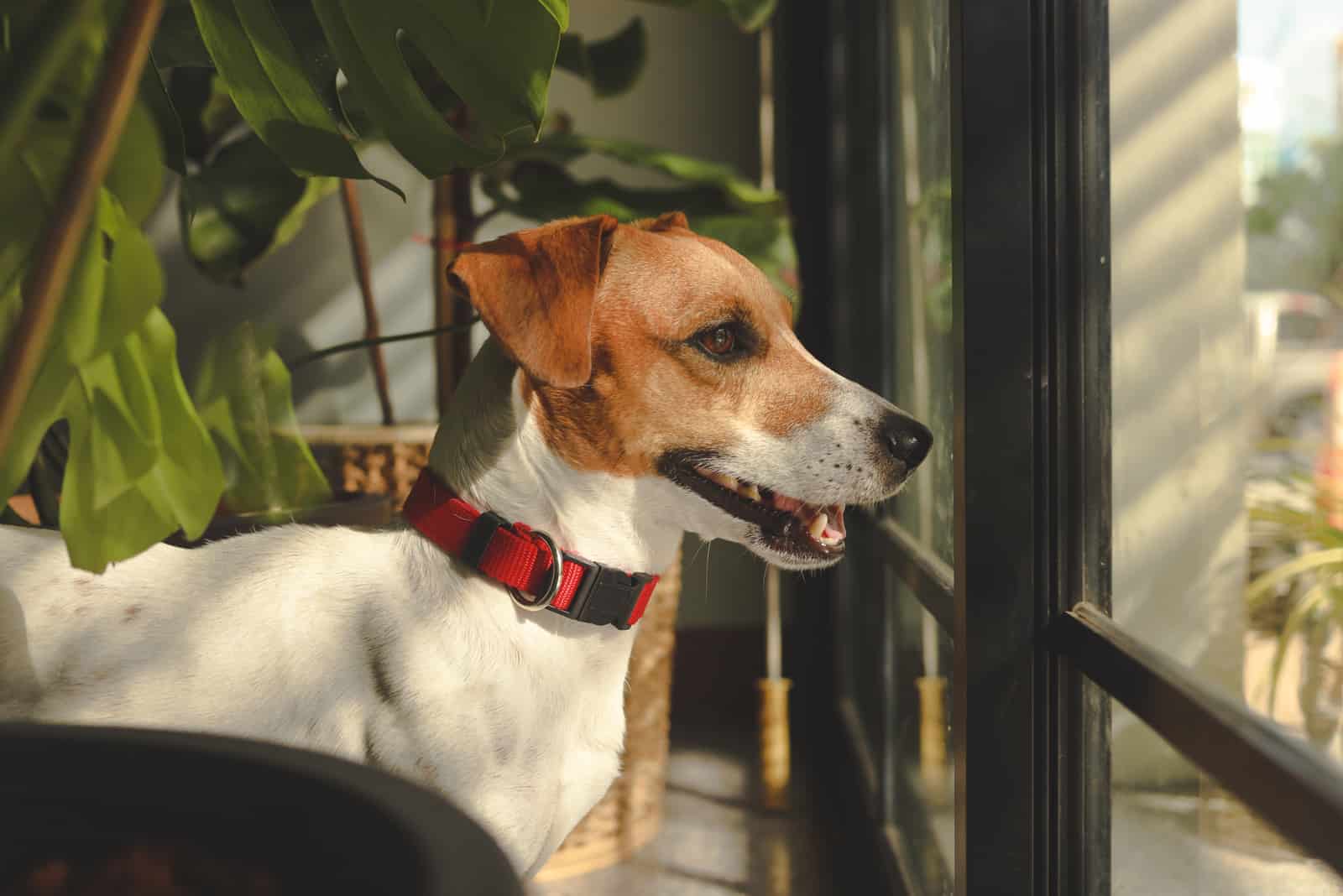
There are certain types of noise that can help mask sounds that dogs might find triggering. There are certain white noise machines or even CDs and audio files with noise that can help a dog relax.
When we hear a noise, our perception of it depends on the sound waves. When we suddenly hear a sound with a specific wave, we get startled, which is the same reason why humans wake up at night when they hear a noise.
The biggest trick is that white noise produces sound waves at all levels at once. As such, when your dog hears a new sound, such as fireworks or a certain high-pitched sound, it won’t have such a large impact on him, and it will be easier for him to ignore it.
White noise can also help calm down an anxious dog, which is another reason why it’s considered to be extremely useful. It’s very helpful for dogs that start barking at the sound of fireworks or car sirens, as it can drown down the noise that’s irritating your dog.
Draw Their Attention Away
The moment your dog starts barking, you can ask him to do something that’s incompatible with barking, such as going to the room or lying down. This is a great way to calm a dog that is excitedly barking.
For example, if your dog barks when someone comes in, you can toss some treats on their bed or in their kennel and tell them to go to the bed that’s preferably in another room. Close the door at first.
As time passes, open the door a bit. If this causes your dog to storm out and start barking again, tell him to go back in, and then close the door.
You should repeat this until your dog learns to stay in the bed until he calms down.
Keep Him Tired
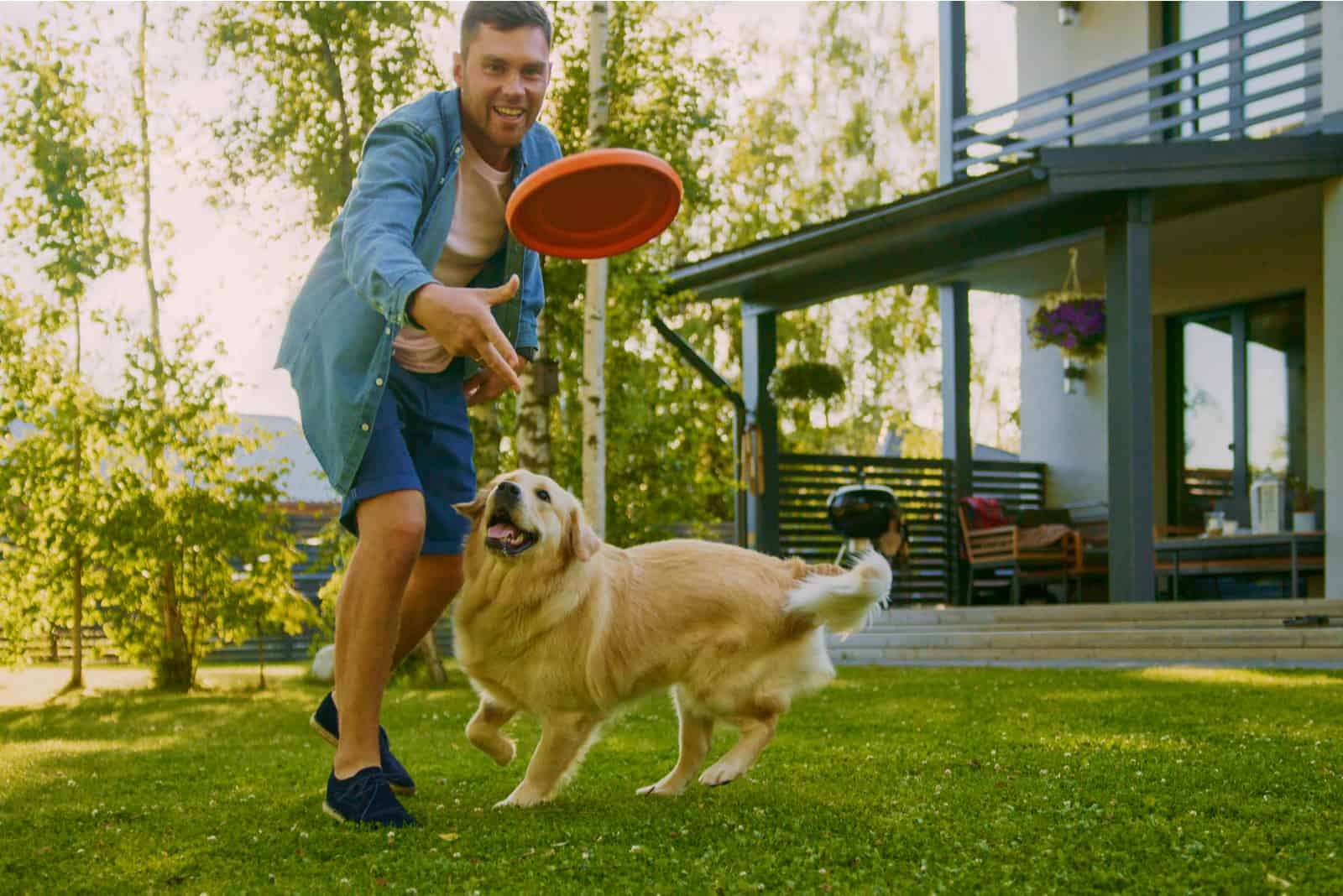
A tired dog is a quiet dog. If your dog gets enough mental and physical stimulation, he’s less likely to bark from frustration or boredom. He might even decide that he shouldn’t bark at strangers or at family members, as he’s too tired to do so!
Different dog breeds have different exercise requirements. Some dogs have to be taken out for a walk every few hours while others will be satisfied with having a few dog toys.
If your dog gets enough exercise so that he doesn’t get bored, he is less likely to bark.
Buy A Bark Collar
Bark collars are designed to stop dogs from barking excessively. They are a form of negative reinforcement that will teach a dog to avoid this behavior.
The use of bark collars is controversial, and many dog lovers are entirely against them. The cruelest type of them all is a shock collar that produces a small amount of electricity when a dog barks, ‘shocking’ him.
However, another type of bark collar is the citronella collar. These collars use a microphone to detect barking, after which they’ll release plant-based citronella fragrance into the air. Citronella fragrance is proven to calm dogs down, reducing barking.
However, citronella bark collars have a specific design that still makes many experts question their cruelness. It might be better to simply spray a citronella fragrance when your dog barks.
Finally, you have ultrasonic bark collars, which is deemed the most humane. These collars will emit an ultrasonic, high-pitch sound when your dog barks. This type of sound will irritate your dog, and he’ll know that it’ll repeat when he barks.
Some ultrasonic collars will even have two types of sound, including one that your dog will like. This will serve as positive reinforcement, teaching your dog that good things come when he stops barking.
Still, keep in mind that many ultrasonic bark collars are combined with electronic shock collars. These collars will first warn your dog by producing a sound, then shock him if he keeps on barking.
While bark collars can be very effective, they can cause harm to your dog, which is why most experts don’t recommend them.
Know When To Contact A Professional

Photo from: @adventures.with.navi
Sometimes, you won’t be able to deal with a dog’s behavior on your own. This is especially the case with dogs adopted from a shelter, as you can never know the type of abuse they’ve endured.
Some people who wonder Why does my dog bark for no reason at all? never find the answer. This is because compulsive behavior is challenging to deal with, and it can be caused by many things.
These types of problems should be left to professionals who know what they are doing.
If you’ve tried many tactics, but your dog is still barking, or if you don’t have a clue as to what is causing your dog to behave in a certain way, there is no shame in asking a professional dog trainer or behaviorist for help.
Some dogs have behavioral problems that have roots that are too deep for you to tackle. Animal behaviorists will know how to deal with this, and they’ll help you correct these behaviors in the healthiest way possible.
Having a dog bark at nothing can not be just annoying, but it can also ruin your peace and your relationship with your neighbors. You need to deal with it on time.
